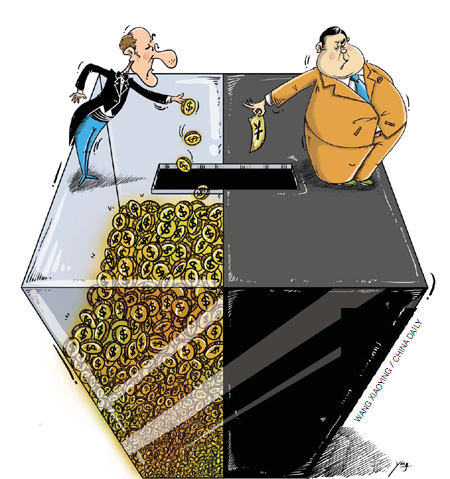Wealthy wary of grand giveaways
Chen once sparked controversy when he stood behind a wall of bank notes to announce his charity trip to poor rural areas in western regions of China.
He later said the move was designed to put pressure on others and spearhead a change in values.
 |
|
Wealthy wary of grand giveaways |
"With the widening gap between rich and poor, China's wealthy class has become resented and, in many cases, misunderstood," said Deng. "If they don't donate, they are considered indifferent; if they give money away, there must be a selfish motive behind it.
"How can that social mentality encourage philanthropy?" he asked.
Ultimately, China has yet to build a healthy environment for charity, one that fosters an active and reputable community of foundations that can act as a platform for the rich and general public to help people in need, say experts.
Although there are no specific laws or regulations banning the establishment of public foundations, in practice most applications fail unless the organization is affiliated with a government department.
Those that actually acquire support from an authority and get the green light to collect donations are subject to official expropriation and tend to lose credibility with the public, said Deng.
Examples abound of public foundations falling short of expectation and even being found to be involved in corruption.
Three months after the massive earthquake hit Yushu, a Tibetan autonomous prefecture in Qinghai province, last April, five government departments jointly issued a circular requiring all public foundations to pass on donations to the provincial government for "better and more efficient distribution of disaster relief funds".
The circular specified the use, management, distribution, supervision and reporting of the funds.
Despite the document's clarity, the move triggered a heated debate in the charity sector, with many arguing that authorities "should not intervene in the operation of charity foundations", as it would be difficult to effectively supervise the flow of money.
Unstable foundations
Shenzhen entrepreneur Yu said he also learned hard lessons some years ago when he found that ambulances he donated to several hospitals in inland provinces had been converted into sedans to chauffeur government officials.
"Very few of China's growing number of charity organizations and foundations tell donors where their money has gone.
"It's easy for local authorities to take advantage of that," said Yu.
Deng agreed and added: "It's not that the wealthy don't want to donate money, they just don't believe in the independence of public foundations in China, which have long been blamed for a lack of transparency and efficiency."
Efforts to operate independent of government agencies is also difficult, such as is the case with the One Foundation, which was launched in 2007 by Chinese movie star Li Lianjie - known in the West as Jet Li - as a project attached to the Red Cross Society of China.
In an interview last month with China Central Television, the State broadcaster, Li said the One Foundation - so called because of the idea that everyone can afford to donate 1 yuan every month - had hit a bottleneck in its development as it could not get approval to register as a public foundation.
The charitable group could be heading for a premature end, Li warned, explaining that once its three-year contract with the Red Cross expires it will be prevented from direct public fundraising.
 0
0 







Go to Forum >>0 Comments